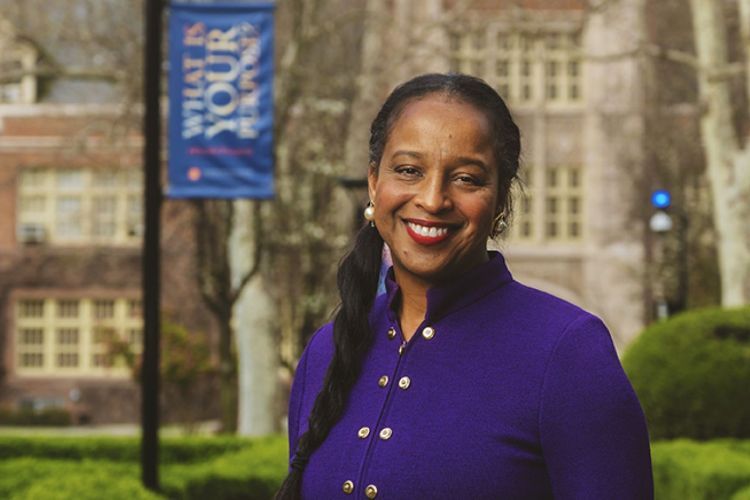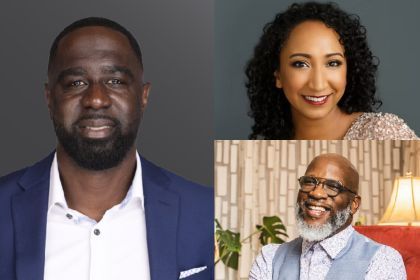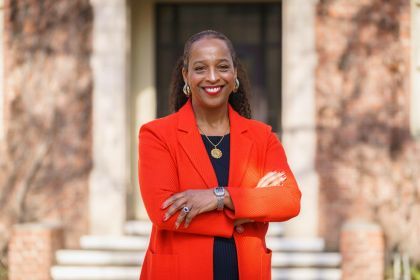Breadcrumb
Restorative Justice and Women's History Month

Mary Wardell-Ghirarduzzi is Pacific's vice president for diversity, equity and inclusion and chief diversity officer.
Dear Pacificans,
March is Women’s History Month and March 8 is International Women’s Day. These celebrations are opportunities to raise up the achievements of women who are forging pathways for change, while also calling out inequity and inequality in society. As we witness current world events, our work to advance equity and equality is pronounced. I want to acknowledge all Pacificans directly impacted with the invasion occurring in Ukraine. We stand in solidarity with those who stand for peace, justice and hope, including our allied communities who are essential in responding to the humanitarian crisis in Ukraine.
In my early career, I learned that at the heart of diversity, equity and inclusion is that students want to know they belong, know they matter and feel they are loved. When a conflict, hurt or disagreement occurred, an important part of my role was to ensure their sense of belonging was not threatened.
To help resolve student conflicts, I needed a humanistic approach that would:
- educate students
- provide healing and resolve disagreements, and,
- restore their relationships with one another
Ultimately, my goal was for the protection of everyone's sense of matter and belonging within the university community.
As I moved into academic and community affairs, I brought our need for belonging and mattering into my work with the faculty and community engagement. Restorative justice methodologies, which prioritize reconciliation and repairing relationships—combined with humanizing principles of reconciliation and social justice in higher education—is the humanizing approach I adopted, which remains central in my teaching, research and leadership.
University of the Pacific is seeking to infuse restorative justice practices into our daily practices including the student conduct process, the Title IX process when appropriate, and other areas. Restorative justice practices view misbehavior as opportunities for learning and understanding with a focus on restoring relationships with authentic accountability (active participation). Restorative Practices invite involved parties to work collaboratively to determine how harm and relationships can be repaired.
Women throughout history have deployed restorative justice practices in their leadership locally and worldwide. This month provides many opportunities to learn about women who have and continue to engage restorative justice practices. Here are a few highlights; see the university calendar for a full listing:
Restorative Practices Workshop | March 7, 8:30 a.m.
Pacific’s Director of Equitable Rights and Responsibilities/Title IX Coordinator Elizabeth Trayner, University Ombuds Hector Escalante, and Assistant Dean for Student Conduct and Community Standards Jared Stammer invite you to attend a one-day course on the Foundations of Restorative Practices. The training will be provided by the Association of Title IX Administrators (ATIXA). Please register with the link in the calendar entry.
Gender Studies Spring Colloquium | March 8, noon
“Her Dream Deferred No More: Reimagining joy, love, and resilience for Black women and girls.” Join Vice President for Diversity, Equity and Inclusion Mary Wardell-Ghirarduzzi as part of the Gender Studies Spring Colloquium.
An Evening with Winona LaDuke | March 10, 6 p.m.
Join us at the DUC Ballroom for an evening with our keynote speaker Winona LaDuke. Winona LaDuke is a Harvard-educated economist, environmental activist, and author. Registration is required and will close at seating capacity. Please register with the link in the calendar entry.
Women of Distinction Awards | March 25, 2 p.m.
This annual awards ceremony recognizes women-identified Pacific students, faculty, staff and members of the Stockton community who have made significant contributions to the advancement of women and gender equity, and/or who have demonstrated outstanding professional or public leadership. Nominate your candidate!
There’s one more thing I’d like to share with you: In my February letter, I gave guidance on the Lunar New Year that requires correction.
After sharing my message, I sat down with a group of Pacificans to discuss the history and meaning of Chinese New Year. Though the origin invites others to reimagine Lunar New Year within other cultural contexts, we can and should always refer to Lunar New Year as Chinese New Year, to honor its country of origin. I want to honor and respect the rich cultures and traditions of our diverse and inclusive community. Chinese New Year is an inclusive celebration and an opportunity to understand the rich history of China. For those impacted by my reference, please know I, too, am always learning and am grateful for our continued conversations.
I urge us all to learn and engage in restorative practices and integrate them into our work and university life. In doing so, we will become the national model for anti-racism and diversity, equity and inclusion in higher education.
With gratitude,
Mary Wardell-Ghirarduzzi
Vice President for Diversity, Equity, and Inclusion
Professor of Communication




